Learning a language takes time, determination and a lot of motivation. Most of the time it’s hard to gather these three factors. However, even if you do, you would presumably encounter some obstacles in your learning process. Vocabulary, is one of them. Probably, the biggest one!
Let’s say it, learning new words in a foreign language it’s hard yet fundamental! Have you ever tried to memorise different lists of vocabulary and feel like it’s not sinking in? This is so frustrating. I know, because I’ve been there as a language learner myself.
Therefore, I’ve always tried to find different ways of learning words. That is why in this blog post I’m going to talk about the top 10 ways to learn French vocabulary!
Hopefully, once you find the best strategy (or strategies) that works for you, your fluency will increase as the numbers of words you’re able to recall increases.
Don’t forget to read our previous blog post to know about different resources to learn French vocabulary.
So, here’s the top 10 ways to learn French vocabulary!
1. Make lists

This is a very basic strategy but still efficient; making lists in both languages that you can read through. I believe it’s like an habit to get used to it with time. Whenever you see or hear a word you should write it down and look for the meaning in a dictionary. I like having a notebook only for vocabulary, but you can also use your PC or smartphone to take notes.
Try to read over and over again your lists. If you struggle with the pronunciation you can always check the right pronunciation on an online dictionary or google translate.
If you feel like it’s not working then follow the next step!
2. Colour-code

You can also try colour-coding to memorise your lists of vocabulary. Use pens of different colours or change your font if you’re typing. Alternatively, you can use highlighters or underliners. You have to make the words stand out for a better memorisation.
3. Use symbols in your lists!
You probably know that in French every noun has a grammatical gender, either feminine or masculine. Unfortunately, you will have to memorise the gender of each noun… So make sure to use some symbols like (nf) for feminine noun and (nm) for masculine noun on your lists. If the word you’re learning is a verb, write (v), (adj) for adjectives and so on… You can find most of these symbols on dictionaries as well.
Be aware of different prepositions a verb can have.
Basically, prepositions are a small set of special “connecting” words that express the relationship between one noun and another (examples: at, in, to, of, from etc.). Many French verbs require a specific preposition in front of a noun or an infinitive. It is important to be aware of that because that little thing can change the whole meaning of a sentence.
Let’s take the example of the verb to talk (or to speak); parler.
You can use parler without a preposition: “Je parle français” (I speak French).
You can also use it with the preposition “avec” (with) “Je parle avec mon ami français” (I talk with my French friend) but if you use the word “de” instead of “avec” ; Je parle de mon ami français. This sentences would mean “I talk about my French friend”.
That is why it is important to know a verb with their different meanings!
4. Ready… Set… Repeat!
So far you’ve got a nice looking notebook with useful words and expressions. Now the important thing is the repetition. Depending on your learning style you may want to repeat a same word several times or rewrite them few more times. Or both!
I find repeating words out-loud more efficient than just repeating in your head. If you’re not sure on the pronunciation, as I mentioned before, you can always check an online dictionary (like wordreference) or Google Translate.
5. Get involved
There’s a Chinese saying that I appreciate very much. It says;
“Tell me and I forget, teach me and I may remember, involve me and I learn”
You might wonder what is the link between this saying and learning French words. Well, making lists, colour-coding, repeating are important factors in order to learn new words but the key is getting to use them! After all, that’s why you are learning words so you can get to use them in conversations when you’re expressing yourself.
A lot of scientists and linguists say that; in order to learn a new word you should use it at least six times so you can have it in your long-term memory. Of course, some people will need to use it more or less than 6 times.
Considering that idea, I always push my students to make different sentences with the word they’re learning.
Did you know that in a duration of 2 weeks time we remember only:
10% of what we read,
20% of what we hear,
30% of what we see,
50% of what we hear and see,
70% of what we say and write and
90% of what we actually participate in.
In other words; the more the involvement, the more we learn and remember in the long term.
I recommend you to make different sentences with a same word. A word can have different meanings, so differ the sentences. Don’t try to make complex ones, a few simple sentences are more than enough!
6. Make flashcards
 If you think that making lists is not efficient, you can always try flashcards!
If you think that making lists is not efficient, you can always try flashcards!
This is when you write a word in english on one side and then on the other side you put that same word in French. Although, it can be a bit time-consuming to make flashcards but you can always find some interesting apps, websites that allow you to do that on your PC or on your phone.
You can arrange them into different categories like colours, family, weather, clothes, description etc. Don’t forget to test yourself as often as possible!
7. Post-it notes

Another useful way to learn and remember vocabulary is using post-it notes. You can label anything around your house or apartment. For example, when you use the TV, open the fridge, or look at the clock, you can read the label attached to it and seeing the same word over and over again will help for a better memorisation.
As I mentioned before, in French nouns are either feminine or masculine. So, make sure to write the right article (un/le for masculine and une/la for feminine) for each noun. Later, when you feel comfortable enough with all these nouns consider adding adjectives and other qualifiers. For example on fridge you can write “le frigo blanc” (the white fridge) or “le frigo est sale” (the fridge is dirty), on the tv you can write “ma télévision” (my television) or “la télévision est allumée/éteinte” (the television is on/off).
There is no limit to what you can learn with post-it notes. If you struggle in grammar, for example, you can simply write the rules and stick them to the mirror or your desk.
8. Use cognates
You may not know that you already use French words every day when you speak English.
And you should thank cognates for that (and probably William the Conqueror)!
Cognates are words that have the same linguistic origin. Generally speaking, they look similar and have the same or similar meanings. For example the word “problem” in English is “problème” in French.
However, be aware of “vrais amis” and “faux amis”!
What we call “vrais amis” (true friends) are cognates that have a similar meaning and spelling both in French and English, like the word “impossible”. Nevertheless, the “faux-amis” (false friends) are the French words that look identical or extremely similar to English; but have an entirely different meaning! For example, the word “actuellement” in French look very similar to “actually” but it indeed means “currently”.
That being said, cognates will be a good help when learning French vocabulary!
9. Make associations
 No matter how hard we try to remember words, sometimes it feels like it won’t sink in! If it’s the case then you should try some mnemonic techniques!
No matter how hard we try to remember words, sometimes it feels like it won’t sink in! If it’s the case then you should try some mnemonic techniques!
You can, for instance, associate something (it could be absolutely anything) to a word that could help you remember it. It could be a picture, a sound, a person or a funny way of saying that word. For example, take the noun for “fish” which is “poisson” in French, to help remembering that word you can think of a poisoned fish lying on the ground. Be creative and don’t forget, logic is not necessary!
If you lack of imagination, you can always try the Memrise app which I talked about it here.
10. Challenge yourself

As I said in the beginning of this post; determination and motivation are very much needed when you learn a language. So, why don’t you challenge yourself ? I like to set myself a challenge when I study vocabulary. It helps me to keep learning and to have fun!
If you’re reading an article or a book in French you can set goals like “learn 3 new words at the end of the article/chapter” or if you’re watching a movie/series in French, challenge yourself to remember a new expression that you’ve heard! Or simply, choose a “word of the day” that would help you learn a new word every day. It can really be anything!
Conclusion
I hope you find these ideas useful! Let me know which of these strategies work best for you. Moreover, I am eager to know if you use any other techniques to learn vocabulary so, feel free to comment below! Thank you so much for reading.






